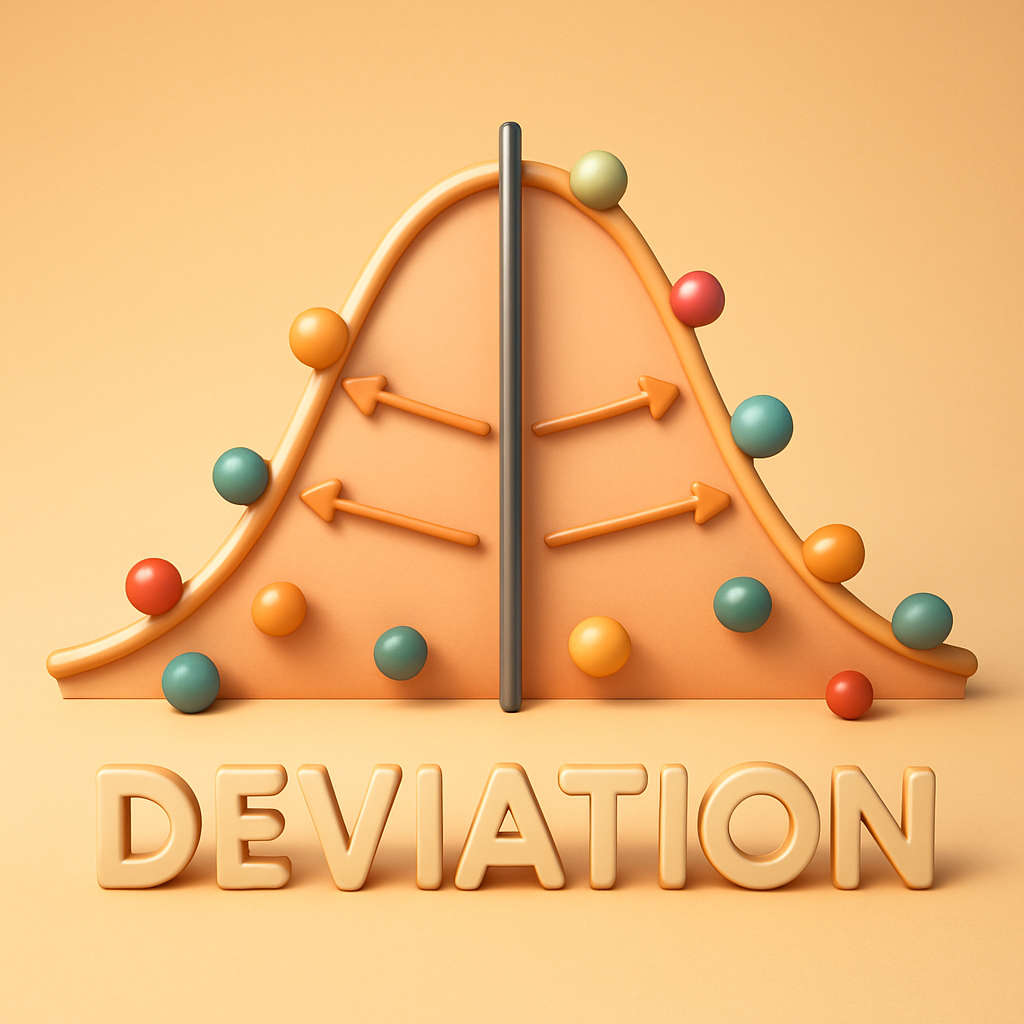Deviation
Definition
Deviation refers to the act or instance of departing from an established course, standard, or norm; it can also denote the amount by which a value differs from a reference value. Its plural form is deviations.
Parts of Speech
- Noun
Pronunciation
American English
- IPA: /ˌdiː.viˈeɪ.ʃən/
- Respelling: dee-vee-AY-shun
British English
- IPA: /ˌdiː.vɪˈeɪ.ʃən/
- Respelling: dee-vi-AY-shun
Etymology
Mid 17th century: from French déviation, from Late Latin deviationem “a turning aside,” from Latin deviare “to turn aside,” from de- “away” + via “way.”
Derivatives
- deviate (verb)
- deviator (noun)
- deviational (adjective)
- deviatory (adjective)
Synonyms
- departure
- divergence
- variance
- digression
- aberration
Antonyms
- conformity
- adherence
- normality
- compliance
Usage
"The pilot corrected the course after a slight deviation."
"The statistical analysis revealed a large deviation from the expected mean."
Related Terms
- Divergence: The process or state of moving apart.
- Variance: The measure of dispersion in statistics.
- Aberration: A departure from what is normal or expected.
- Digression: A temporary departure from the main subject.
- Departure: The act of leaving or deviating from a path.
Detailed Definitions
Noun
- The act of departing from an established course, direction, or standard – an instance of moving away from an expected path.
- Example: "A slight deviation in the flight path required adjustment."
- The amount by which a value differs from a reference or expected value – a quantitative measure of variation.
- Example: "The standard deviation indicated significant spread in the data."
- A departure from accepted norms or practices – a divergence in behavior or expectation.
- Example: "His actions represented a deviation from company policy."
deviation



🇨🇳 Mandarin (Simplified Chinese)
- 偏差
- IPA Pronunciation: /pjɛn˩˧ tʂʰa˥˩/
- Respelling in English: piān chā
- 偏移
- IPA Pronunciation: /pjɛn˩˧ ji˩˥/
- Respelling in English: piān yí
🇮🇳 Hindi
- विचलन
- IPA Pronunciation: /ʋɪʧ.lən/
- Respelling in English: vichalan
- भिन्नता
- IPA Pronunciation: /bʱɪn.nə.taː/
- Respelling in English: bhinnataa
🇪🇸 Spanish
- Desviación
- IPA Pronunciation: /desʋjaˈθjon/
- Respelling in English: des-via-thion
- Anomalía
- IPA Pronunciation: /anomaˈlia/
- Respelling in English: anoma-lia
🇫🇷 French
- Déviation
- IPA Pronunciation: /devjasjɔ̃/
- Respelling in English: day-vya-syon
- Écart
- IPA Pronunciation: /ekar/
- Respelling in English: e-kar
🇸🇦 Modern Standard Arabic
- انحراف
- IPA Pronunciation: /inh̩raːf/
- Respelling in English: in-hraaf
- تباين
- IPA Pronunciation: /tabaːjin/
- Respelling in English: tabaayin
🇧🇩 Bengali
- অপসরণ
- IPA Pronunciation: /ɔpɔʃɔrɔn/
- Respelling in English: oposhoron
- বিচ্যুতি
- IPA Pronunciation: /bitʃjuti/
- Respelling in English: bichyuti
🇷🇺 Russian
- Отклонение
- IPA Pronunciation: /ɐtklɐˈnʲenʲɪjə/
- Respelling in English: otkloneniye
- Аномалия
- IPA Pronunciation: /ənɐˈmalʲɪjə/
- Respelling in English: anomalija
🇵🇹 Portuguese
- Desvio
- IPA Pronunciation: /ˈdɛʃ.vju/
- Respelling in English: desh-vyoo
- Anomalia
- IPA Pronunciation: /ɐ.nɔ.ˈma.li.ɐ/
- Respelling in English: an-o-ma-lee-a
🇮🇩 Indonesian
- Penyimpangan
- IPA Pronunciation: /pəɲim.pa.ŋan/
- Respelling in English: pen-yim-pang-an
- Deviasi
- IPA Pronunciation: /dɛ.vi.a.si/
- Respelling in English: de-via-si
🇩🇪 German
- Abweichung
- IPA Pronunciation: /ˈap.vaɪ̯.ʃʊŋ/
- Respelling in English: ap-waich-ung
- Anomalie
- IPA Pronunciation: /anoˈmaː.liː/
- Respelling in English: an-o-maa-lee
🇯🇵 Japanese
- 偏差
- IPA Pronunciation: /hensa/
- Respelling in English: hen-sa
- 逸脱
- IPA Pronunciation: /itsudatsu/
- Respelling in English: itsu-datsu
🇻🇳 Vietnamese
- Sự lệch
- IPA Pronunciation: /sʊʔ lɛ̂t͡ɕ/
- Respelling in English: su lech
- Sự sai khác
- IPA Pronunciation: /sʊʔ saːi kʰaːk˧/
- Respelling in English: su sai khak
🇰🇷 Korean
- 편차
- IPA Pronunciation: /pʰjʌn.tɕʰa/
- Respelling in English: pyun-cha
- 이탈
- IPA Pronunciation: /i.tʰal/
- Respelling in English: ee-tal
🇹🇷 Turkish
- Sapma
- IPA Pronunciation: /sapˈma/
- Respelling in English: sap-ma
- Anomali
- IPA Pronunciation: /anomaˈli/
- Respelling in English: anoma-lee
🇵🇰 Urdu
- انحراف
- IPA Pronunciation: /inh̩raːf/
- Respelling in English: in-hraaf
- تبدیلی
- IPA Pronunciation: /tabˈdiːliː/
- Respelling in English: tabdeeli





